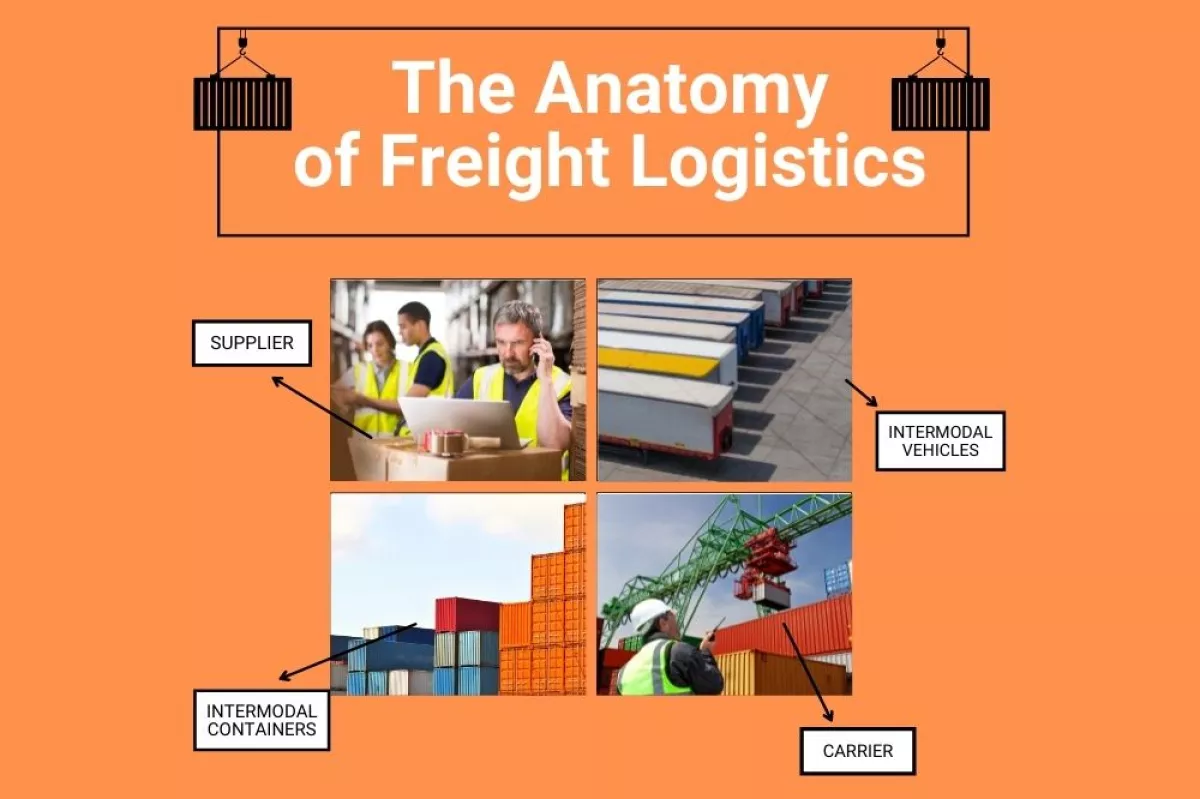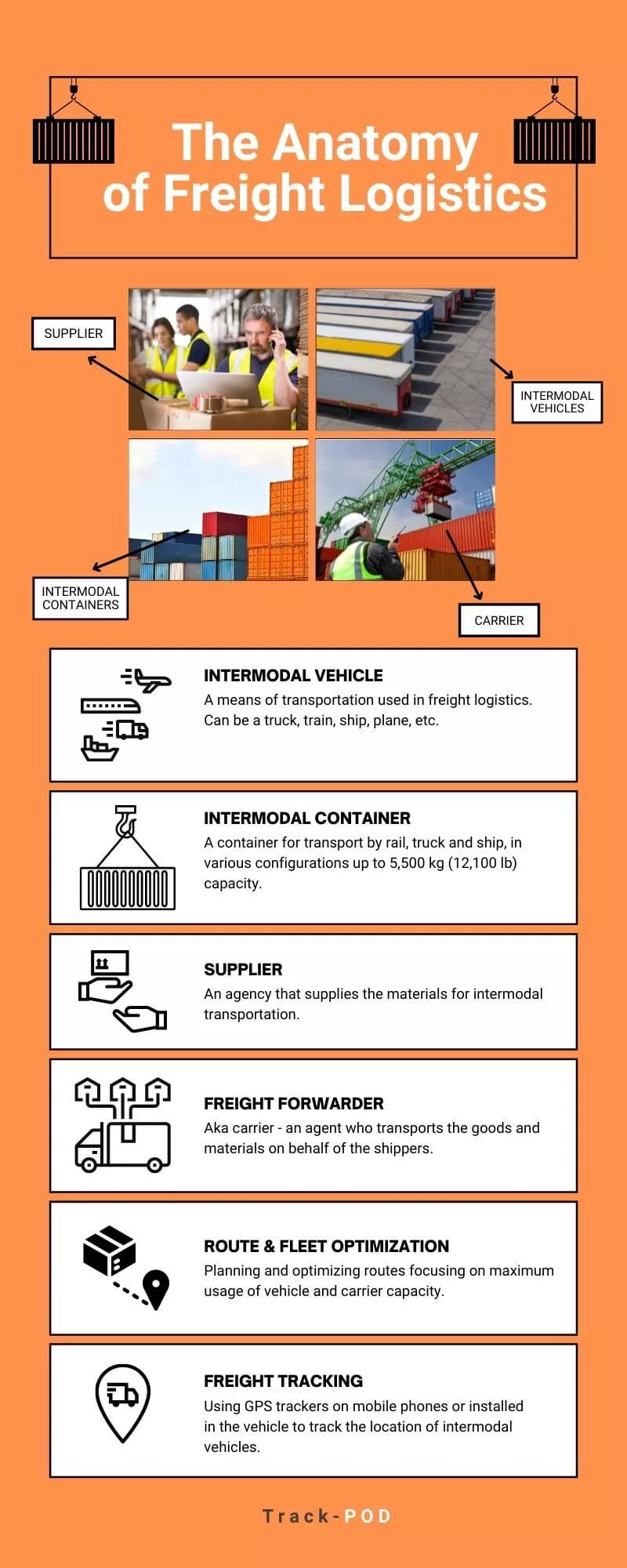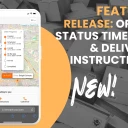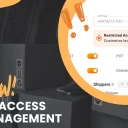Freight Logistics 101: the Anatomy & Place in the Supply Chain [Infographic]
Updated on
August 02, 2021
by
Yulia Miashkova

Freight logistics is the backbone of many industries that require goods and commodities to be transported over long distances and by multiple means of transportation. It requires complex planning, excellent coordination, efficient team work, and, of course, reliable equipment and tools. On today's menu, we have freight logistics: its anatomy and place in the supply chain.
What is freight logistics?
Freight logistics refers to transportation of goods, materials, or any items in bulk by means of surface, air, or sea/ocean transport. More often than not, freight logistics is referred to as intermodal transportation as it's applied to long-haul freight. In this case, freight logistics involves steel containers that are stored in container ports and transported by various carriers before they reach a final destination.
Let's take a closer look at the anatomy of freight logistics.

As you can see, we have the supplier and carrier aka freight forwarder at the center of the process, as well as intermodal vehicles and containers as means of getting cargo from point A to point B. Freight logistics is based on a complex network of actors and tools that take years to tune in.
For the most part, freight logistics in 2021 relies on the same principles as in the early 2000s as it's not changing much over time. Maersk is still the largest container shipping line and vessel operator in the world. What has changed, however, is the tools and technology such as Transportation Management Systems (TMS) that automate a lot of previously manual processes and improve supply chain efficiency by a long shot.
What is freight forwarding?
Another name for freight logistics is freight forwarding. A forwarder or forwarding agent provides the transportation services needed to move cargo on behalf of shippers. Carriers are the companies that constitute an important part of the transportation industry.
Freight forwarding companies are also known as third-party logistics providers or 3PL since they cover order fulfillment from storage to shipping. That's why companies that offer international shipping use a service of a designated freight forwarder a lot of the time.
Best freight forwarders in 2021
Below are some of the best and most efficient freight forwarding carriers providing delivery services by air, sea, and road. They offer transportation services to any company that has customers overseas and needs to outsource a company with transportation as their main field of expertise.
- DHL Global Forwarding - air and ocean freight forwarding services (Germany).
- Kuehne + Nagel - sea freight and air freight forwarding, contract logistics, and overland businesses (Switzerland).
- Sinotrans - transportation services including storage and terminal services, trucking, and marine transportation (China).
- UPS Supply Chain Solutions - global supply chain management (US).
- DSV - transportation services by road, air, sea, and train (Denmark).
Freight logistics & supply chain management
Supply chain management is intertwined with freight logistics that ensures getting products to customers wherever in the world they might be. Let's look at the links between freight logistics, carriers, and the supply chain to see how it all comes together for order fulfillment.
Technology
Supply chain at large and freight logistics in particular depend heavily on designated technology and tools. In addition to TMS, there are ERPs, CRMs, and delivery management software that all need to be integrated and working in complete sync. Based on how well the tools fit the needs of the industry and the particular company, everything from inventory management to the final delivery experience can improve or deteriorate enormously.
Below are some of the major tasks handled by the right technology in supply chain management and freight logistics.
- Order import, including by shippers themselves.
- Route planning & route optimization.
- Load checks, including shipping labels, QR/barcode scanning.
- GPS tracking.
- Dynamic estimated time of arrival (ETA).
- Instant communication.
- Analytics, Proof of Shipment, and Proof of Delivery.
Compliance
Because of the nature of intermodal transportation, logistics companies, trucking businesses, and all kinds of carriers need to comply with a lot of regulations governing customs management. Working internationally, forwarding agents use in-house legal help and make sure to get fluent at Incoterms®.
Incoterms® stands for international commercial terms. These have been published for many years by the International Chamber of Commerce and constitute a universal set of rules and guidelines related to international trade.
Sustainability
We live in a time when any transportation business can not be functioning at its best without a designated service that offsets its carbon footprint. Even huge corporations like DHL and UPS have to welcome carbon-neutral shipping practices to make up for the years of intense carbon emissions.
The requirement to get sustainable is very serious and will only increase over time. Both supply chain and logistics managers have to welcome green practices to deliver on the sustainability front.
Final thoughts
Freight logistics plays a major part in supply chain management and in a way determines its efficiency. Much like all logistics, it requires good practices, compliance, and reliable tools. I hope this article gives you insight into freight logistics and its place in the supply chain.
If you need a reliable technology service that covers key aspects of transportation management check out Track-POD reviews, e.g. the one published on Appslikethese. Make sure you book a demo with the Track-POD team and see what kind of solutions we have for you.




